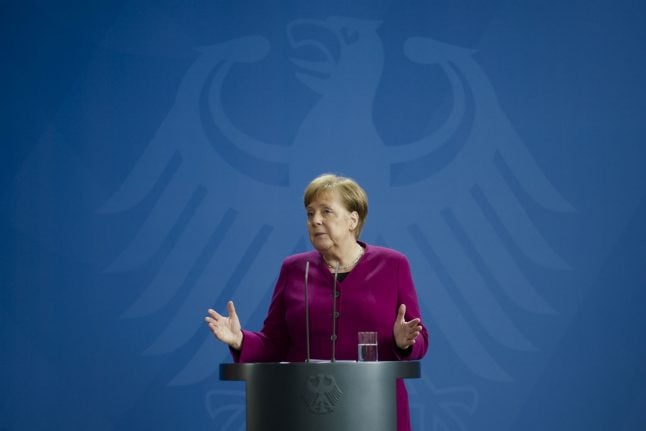“We must not allow ourselves to be lulled into a false sense of security,” the Chancellor warned at a press conference leading up to Germany’s four-day Easter weekend.
The debate over when and how to lift the measures continues to grow in Germany, especially after neighbouring Austria announced plans this week to relax its curbs.
Merkel said that Germany could be “happy” that it had avoided more stringent measures such as those in France, Spain or Italy, but warned that the situation was still “fragile”.
Restrictions would only be lifted “slowly”, she said, with their effectiveness reviewed on a “two to three week basis”.
After Easter, the federal and state governments want to discuss the restrictions. Health Minister Jens Spahn, also of Merkel's Christian Democratic Union (CDU) party, called the holiday a “fork in the road” that would decide whether rules could be relaxed.
READ ALSO: Germany could see 'gradual return to normality' after Easter holidays
“We must not be careless now – we must remain focused – the situation is fragile,” said Merkel as she urged Germans to abide by the rules over Easter weekend so that they would not “endanger” what’s been achieved so far.
As of Thursday at 4pm, there were more than 113,000 confirmed coronavirus cases in Germany, as well as 2,349 deaths, according to data from Johns Hopkins University. Over 50,000 have reported themselves to be fully recovered.
The current restrictions – which include keeping a distance of 1.5 metres between people and only meeting with one person outside of the home – are officially in place until April 19th.
The veteran leader said recent figures were cause for “cautious optimism”, but insisted that restrictions on public life would only be able to be rolled back on a step-by-step basis.
She said that she could not yet predict what this means for upcoming summer holidays. “I think day to day,” said the Chancellor, adding that, “The rules will remain in place as long as we do not have a vaccine that can be used to immunize the population against the virus.”
Yet “the curve is flattening out and the doubling time is slowing down,” said Merkel, referring to one of the ways in which researchers see whether measures are effective.
The country appears to be out of a period exponential growth, with Spahn noting that “the number of new infections is beginning to level off”.
READ ALSO: 'A pandemic knows no holidays': Germany extends coronavirus curbs on public life
Yet Robert Koch Institute (RKI) president Lothar Wieler cautioned that it was too early to “talk about an easing-off”, as the daily number of new cases continued to fluctuate.
While the Chancellor said she had recently been concerned that measures would have to be tightened, she does not feel this is necessary at the moment.
A decision on relaxing the measures must be taken when the ground is firm. “We must proceed very, very carefully”, she said.
'Better if we hold out'
Before Merkel spoke, Health Minister Spahn took to the podium, and also made an appeal to the public to follow the rules, even amid the weekend weather that is expected to reach up to 28C in some areas.
He warned against using the term “exit” when discussing a loosening of the current restrictions.
“It suggests that immediately afterwards everything will be the same as before. But it won’t be.”
Federal Minister of Economics Peter Altmaier (CDU) also advocated a cautious approach to the way out of the crisis.
“It is also better for the economy if we hold out disciplined for a few days longer than if we start too early and then have to take back easing measures,” he said.
The majority of the population is satisfied with Germany’s handling of the crisis, according to a survey from public broadcaster ZDF published on Thursday.
A full 80 percent of respondents said that they were satisfied with the work of Angela Merkel, while 88 percent of respondants said that they were happy with the work of the government.
Around 56 percent of the Germans consider an easing of restrictions in everyday life from April 20th onwards to be too early, according to a representative Civey survey for the magazine “Business Insider”, on Thursday.
According to the survey, just under 30 percent of respondents consider easing from April 20th to be appropriate, while only 9.4 percent consider it to be “too late”.
With reporting by AFP.



 Please whitelist us to continue reading.
Please whitelist us to continue reading.
Member comments